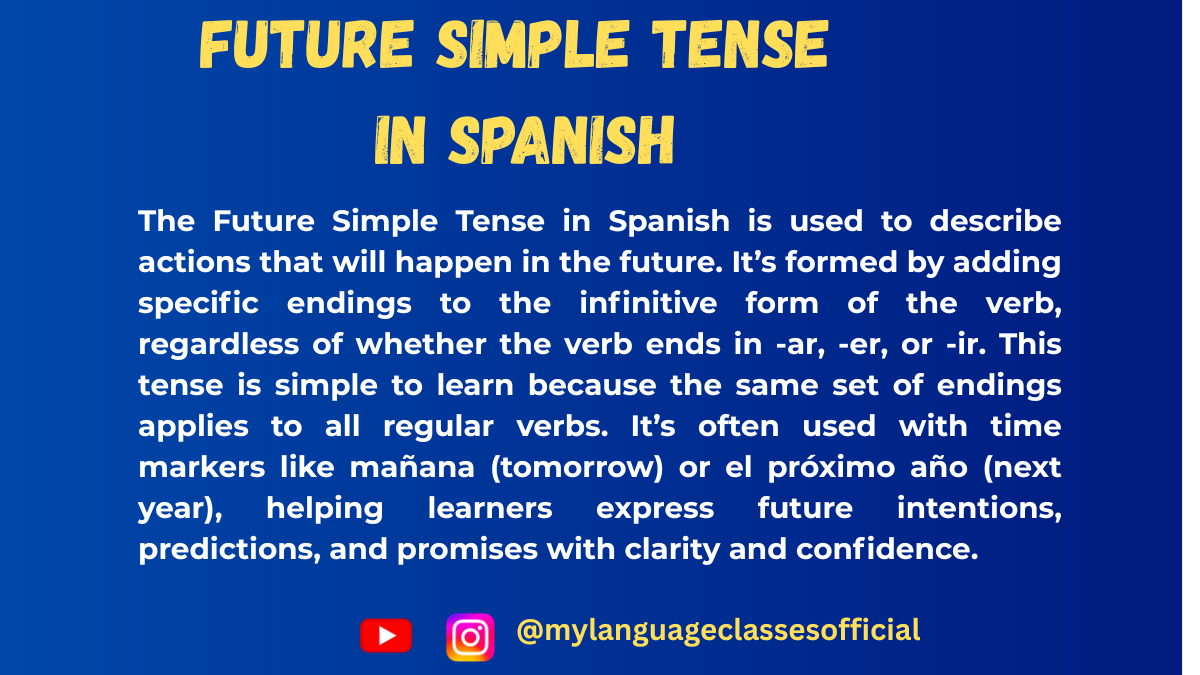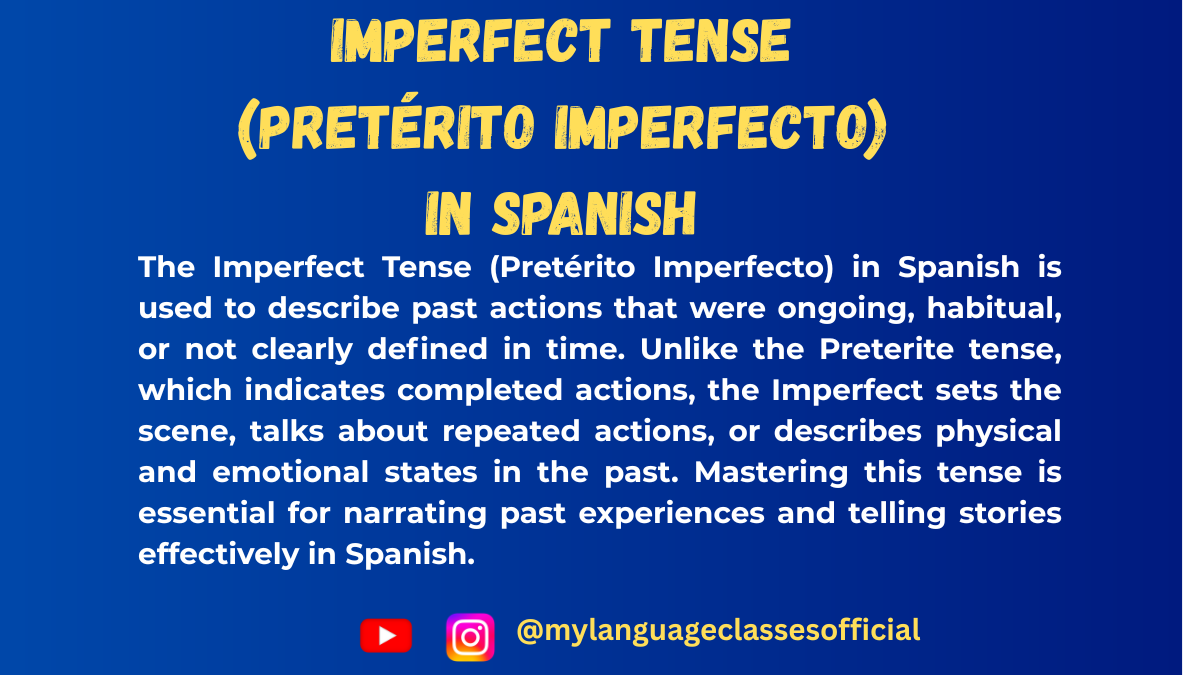Your cart is currently empty!
Tag: how to use future simple tense in Spanish
-

Future Simple Tense in Spanish (Futuro Simple)
Future Simple Tense in Spanish
The Future Simple tense in Spanish is used to talk about actions or events that will happen in the future. It’s an essential tense for expressing plans, predictions, promises, or possibilities. Here, we’ll explore how to form the Future Simple tense, its applications, common verbs, and expressions used in everyday life.
Situations Where the Future Simple Tense is Used
- Expressing Intentions or Plans
- Example: Mañana visitaré a mi abuela.
(Tomorrow, I will visit my grandmother.)
- Example: Mañana visitaré a mi abuela.
- Making Predictions
- Example: Lloverá esta tarde.
(It will rain this afternoon.)
- Example: Lloverá esta tarde.
- Expressing Assumptions or Guesses
- Example: ¿Quién será a la puerta?
(Who might be at the door?)
- Example: ¿Quién será a la puerta?
- Giving Commands in a Polite Way
- Example: Abrirás el libro en la página diez.
(You will open the book on page ten.)
- Example: Abrirás el libro en la página diez.
- Expressing Promises or Determination
- Example: Te llamaré más tarde.
(I will call you later.)
- Example: Te llamaré más tarde.
Forming the Future Simple Tense
In Spanish, the Future Simple tense is formed by adding specific endings to the infinitive form of the verb. The endings are the same for -ar, -er, and -ir verbs.
Regular Verbs
- Endings:
-é, -ás, -á, -emos, -éis, -án
Examples with Regular Verbs:
- Hablar (to talk)
- Yo hablaré (I will talk)
- Tú hablarás (You will talk)
- Él/Ella/Usted hablará (He/She/You formal will talk)
- Nosotros hablaremos (We will talk)
- Vosotros hablaréis (You all will talk)
- Ellos/Ellas/Ustedes hablarán (They/You all formal will talk)
- Comer (to eat)
- Yo comeré (I will eat)
- Tú comerás (You will eat)
- Él/Ella/Usted comerá (He/She/You formal will eat)
- Nosotros comeremos (We will eat)
- Vosotros comeréis (You all will eat)
- Ellos/Ellas/Ustedes comerán (They/You all formal will eat)
- Vivir (to live)
- Yo viviré (I will live)
- Tú vivirás (You will live)
- Él/Ella/Usted vivirá (He/She/You formal will live)
- Nosotros viviremos (We will live)
- Vosotros viviréis (You all will live)
- Ellos/Ellas/Ustedes vivirán (They/You all formal will live)
Irregular Verbs
Some verbs have irregular stems in the Future Simple tense but use the same endings. Here’s a list of common irregular verbs:
Infinitive Stem Example Sentence Tener (to have) Tendr- Tendré dinero mañana. (I will have money tomorrow.) Hacer (to do/make) Har- Harás los deberes. (You will do the homework.) Poder (to be able to) Podr- Podremos ir al cine. (We will be able to go to the cinema.) Decir (to say/tell) Dir- Dirán la verdad. (They will tell the truth.) Salir (to leave) Saldr- Saldré temprano. (I will leave early.) Venir (to come) Vendr- Vendrás a mi casa. (You will come to my house.) Saber (to know) Sabr- Sabrá la respuesta. (He/She will know the answer.) Poner (to put) Pondr- Pondremos la mesa. (We will set the table.) Querer (to want) Querr- Querrán un helado. (They will want ice cream.)
Daily Expressions Using the Future Simple Tense
Here are common expressions with their meanings and example sentences:
- ¿Qué harás mañana?
(What will you do tomorrow?)- Example: Estudiaré para el examen. (I will study for the exam.)
- Todo saldrá bien.
(Everything will be fine.)- Example: No te preocupes, todo saldrá bien. (Don’t worry, everything will be fine.)
- Nos veremos pronto.
(We will see each other soon.)- Example: Nos veremos el sábado. (We will see each other on Saturday.)
- Será un día largo.
(It will be a long day.)- Example: Mañana será un día largo en el trabajo. (Tomorrow will be a long day at work.)
- Lo haré luego.
(I will do it later.)- Example: No te preocupes, lo haré luego. (Don’t worry, I’ll do it later.)
Things to Keep in Mind
- Articles and Gender:
Use definite (el, la, los, las) or indefinite (un, una, unos, unas) articles depending on the noun. Ensure they match in gender and number.- El coche será mío. (The car will be mine.)
- Las flores estarán listas. (The flowers will be ready.)
- Pronoun Placement:
When using pronouns, ensure they are appropriately placed with conjugated verbs.- Example: Me lo dirás mañana. (You will tell me tomorrow.)
- Reflexive Verbs:
Reflexive verbs retain their reflexive pronouns in the Future Simple tense.- Example: Me despertaré temprano. (I will wake up early.)
Practice Makes Perfect!
To master the Future Simple tense, practice forming sentences with regular and irregular verbs. Engage in daily conversations using common expressions, and don’t hesitate to make predictions, promises, or guesses in Spanish!
If you found this guide helpful, I’d love to hear from you! Share your thoughts in the comments below or connect with me on social media. For more tips, resources, and inspiration, visit my blog at mylanguageclasses.in. Follow on Instagram and subscribe on YouTube
📚 Continue Learning Spanish
- Expressing Intentions or Plans
-

Imperfect Tense (Pretérito Imperfecto) in Spanish
Imperfect Tense (Pretérito Imperfecto)
The Pretérito Imperfecto is one of the past tenses in Spanish, used to describe habitual actions, ongoing events, and situations in the past. It provides context or background without indicating when the action specifically started or ended. Below, we’ll explore its use, conjugation for regular and irregular verbs, and common expressions.
When Do We Use the Pretérito Imperfecto?
- Describing habitual or repeated actions in the past
- Example: Cuando era niño, jugaba al fútbol todos los días.
(When I was a child, I played soccer every day.)
- Example: Cuando era niño, jugaba al fútbol todos los días.
- Setting the scene or providing background information
- Example: Hacía frío y nevaba cuando llegué a casa.
(It was cold, and it was snowing when I arrived home.)
- Example: Hacía frío y nevaba cuando llegué a casa.
- Describing mental states, emotions, or physical conditions in the past
- Example: Estaba cansado después del trabajo.
(I was tired after work.)
- Example: Estaba cansado después del trabajo.
- Actions that were in progress in the past (without focusing on their start or end)
- Example: Leía un libro mientras ella cocinaba.
(I was reading a book while she was cooking.)
- Example: Leía un libro mientras ella cocinaba.
- Telling time and age in the past
- Example: Eran las cinco de la tarde.
(It was five in the afternoon.)
Tenía veinte años en ese momento.
(I was twenty years old at that time.)
- Example: Eran las cinco de la tarde.
Forming the Pretérito Imperfecto
The conjugation of regular verbs in the imperfect tense follows specific patterns for each verb group: -ar, -er, and -ir.
Regular Verbs
- -AR VerbsSubjectEndingExample (hablar)Yo-abahablabaTú-abashablabasÉl/Ella-abahablabaNosotros-ábamoshablábamosVosotros-abaishablabaisEllos-abanhablaban
- -ER VerbsSubjectEndingExample (comer)Yo-íacomíaTú-íascomíasÉl/Ella-íacomíaNosotros-íamoscomíamosVosotros-íaiscomíaisEllos-íancomían
- -IR Verbs
Conjugation is identical to -er verbs.- Example: vivir
vivía, vivías, vivía, vivíamos, vivíais, vivían
- Example: vivir
Key Irregular Verbs in the Pretérito Imperfecto
- Ir (to go)
- Iba, ibas, iba, íbamos, ibais, iban
- Ser (to be)
- Era, eras, era, éramos, erais, eran
- Ver (to see)
- Veía, veías, veía, veíamos, veíais, veían
Things to Keep in Mind
- Articles and Gender: When describing objects or actions, make sure articles (el, la, los, las) match the noun’s gender and number. For example:
- El sol brillaba. (The sun was shining.)
- Las estrellas iluminaban el cielo. (The stars lit up the sky.)
- Context and Time Expressions: Words like siempre (always), a menudo (often), cuando era niño/a (when I was a child), mientras (while), and todos los días (every day) are often used with the imperfect tense.
Common Expressions with Pretérito Imperfecto
- Cuando era niño/a – When I was a child
- Cuando era niña, me encantaba jugar con muñecas.
(When I was a little girl, I loved playing with dolls.)
- Cuando era niña, me encantaba jugar con muñecas.
- Todos los días – Every day
- Todos los días iba a la escuela a pie.
(Every day I walked to school.)
- Todos los días iba a la escuela a pie.
- Siempre – Always
- Siempre veía la televisión después de la cena.
(I always watched TV after dinner.)
- Siempre veía la televisión después de la cena.
- A menudo – Often
- A menudo visitábamos a nuestros abuelos los domingos.
(We often visited our grandparents on Sundays.)
- A menudo visitábamos a nuestros abuelos los domingos.
- Mientras – While
- Mientras ella cocinaba, él ponía la mesa.
(While she was cooking, he was setting the table.)
- Mientras ella cocinaba, él ponía la mesa.
Common Verbs in Pretérito Imperfecto with Examples
- Hablar (to talk)
- Yo hablaba con mis amigos cada tarde.
(I used to talk with my friends every afternoon.)
- Yo hablaba con mis amigos cada tarde.
- Comer (to eat)
- Nosotros comíamos juntos todos los sábados.
(We ate together every Saturday.)
- Nosotros comíamos juntos todos los sábados.
- Vivir (to live)
- Ellos vivían en Madrid en los años 90.
(They lived in Madrid in the 90s.)
- Ellos vivían en Madrid en los años 90.
- Estar (to be)
- Él estaba feliz en esa época.
(He was happy at that time.)
- Él estaba feliz en esa época.
- Leer (to read)
- Ella leía un libro cuando la llamé.
(She was reading a book when I called her.)
- Ella leía un libro cuando la llamé.
The Pretérito Imperfecto is a versatile tense that captures the nuances of the past in Spanish. By practicing its conjugation, understanding its context, and incorporating common expressions, you’ll master its use in no time!
If you found this guide helpful, I’d love to hear from you! Share your thoughts in the comments below or connect with me on social media. For more tips, resources, and inspiration, visit my blog at mylanguageclasses.in. Follow on Instagram and subscribe on YouTube
📚 Continue Learning Spanish
- Describing habitual or repeated actions in the past
